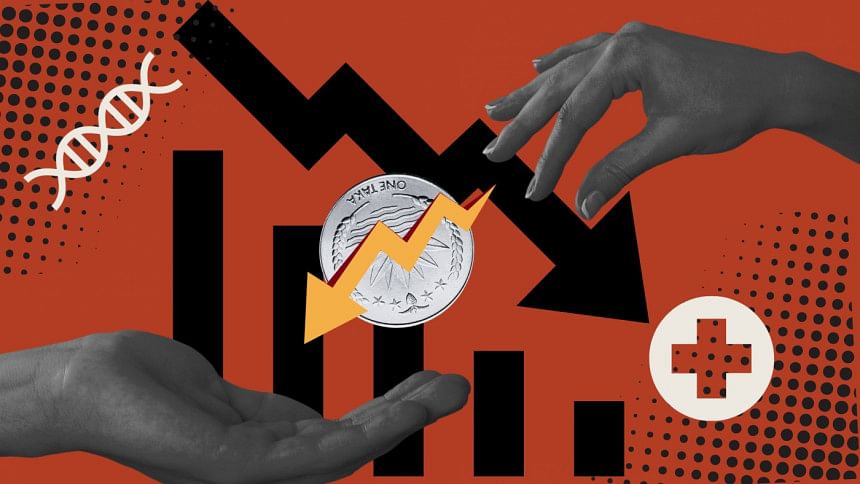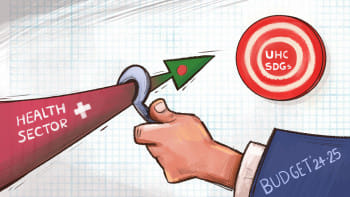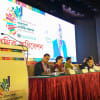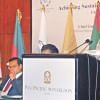How healthy is the health budget?

UHC Forum is a coalition of professionals who aim to strategically push for universal health coverage (UHC)—an SDG4 priority. It recently organised a webinar on how well this year's budget relates to key health sector challenges. Five experts share their views on the matter with The Daily Star.
****************************************************
Dr Rumana Huque is professor, Department of Economics, University of Dhaka.
The proposed health sector budget of 2024-25 emphasises on achieving the Sustainable Development Goals (SDGs) by 2030 and the goals of the Perspective Plan by 2041. The proposed allocation for health is Tk 41,407 crore, which was Tk 38,051 crore in FY2023-24. Though this represents an increase of 8.8 percent in absolute terms, in real terms it is a decrease if inflation is considered. With small variations over the past decade, the health sector budget has remained stagnant at around five percent of the national budget. This is far below the international standard, which suggests allocating 15 percent of the government budget to health. Experts suggest that every government should commit to spending at least five percent of their GDP on health and move progressively towards this target. The 8FYP (eighth five year plan) committed to allocate two percent of the GDP towards the health sector by 2025. In contrast, the health budget has remained around 0.7 percent of GDP. India's current public healthcare spending is around 1.6-1.8 percent of GDP, and they are aiming to increase the public healthcare spending to 2.5 percent by 2025.
It is also suggested that the government should ensure health expenditure of at least $88 per person per year. The World Bank data suggests that the per capita health expenditure is $74 in India and $65 in Nepal, but only $58 in Bangladesh. Furthermore, a large portion of this health expenditure is paid by the people themselves: out-of-pocket (OOP) health expenditure as a proportion of current health expenditure is 73 percent in Bangladesh compared to 50 percent in India and 51.26 percent in Nepal and 17.05 percent globally.
The allocation of Tk 100 crore for "Integrated Health-Science Research and Development Fund" is a good initiative, but the key issue here is its efficient utilisation. The import duty on dialysis filters and dialysis circuits has been reduced from 10 percent to one percent on import, but 10 percent customs duty on import of medical equipment and supplies by referral hospitals has been imposed. We need to avoid creating additional burdens on people seeking health care.
****************************************************
Dr Syed Abdul Hamid is professor, Institute of Health Economics, University of Dhaka.
There are two important lenses through which to assess this year's budget. The first is an equity lens. Two of the health sector programmes explicitly addressed to poorer citizens—the Shasthyo Shurokhsha Karmasuchi (SSK) and the maternal voucher scheme—have seen no horizontal or vertical expansion in allocation.
The second lens to assess the budget through is an efficiency lens. The proposed budget does not provide any noteworthy plan to enhance the functionality and efficiency of public health facilities. It does not propose measures to fill the current workforce vacancies, to create new positions necessary for dealing with emerging and re-emerging diseases, or enhance the supply chain of essential medicines.
There is a clear need for dedicated modern storage facilities, an updated dispensing mechanism, and improved diagnostic facilities, all of which are not addressed in the current budget. There is a notable absence of initiatives to strengthen primary healthcare in both rural and urban areas. Furthermore, there is no indication of optimising the existing budget by addressing the well-known governance constraints, whether at ministry/directorate level or at facility-level. Genuine political and administrative support is required from the ministry and directorate levels to ensure efficient use of the allocated funds.
****************************************************
AMM Nasiruddin is former Secretary, Ministry of Health and Family Welfare.
An important concern with the health sector budget is incomplete utilisation of allocated funds. Due to this, a substantial amount must be surrendered to the Ministry of Finance at the end of the fiscal year despite the glaring needs of the sector.
There are several reasons for the low utilisation of the health budget. One is the gap in training of health facility managers on government financial management and rules relating to government procurement. Such shortcomings in many cases hinder and cause delays in timely budget utilisation.
A second reason is the over-centralisation of decision-making related to budget utilisation. Implementing authorities have little or no authority for adjustment of line items even when warranted by circumstances. Such adjustments require approval of higher authorities, and the process is both complex and time consuming. Delay in fund release, rigid spending rules, over-spending without appropriation, payment of arrear bills causing budget shortfall, excessive financial management requirements, fear of audit objections, absence of a robust monitoring, and accountability mechanism, etc. contribute to low rate of budget utilisation in the health sector. During the budget finalisation at the end of the month, an explicit recognition of this entrenched problem of low utilisation of the health budget and its well-known underlying reasons will be a very welcome first step.
****************************************************
Dr Aminul Hasan is quality care expert and former director, Directorate General of Health Services.
Despite a nominal increase, this year's budget, as indeed the budgets of previous years too, remain glaringly inadequate given the population size and healthcare demands. The priority health sector requirements are in primary healthcare, maternal and child health (MCH), and non-communicable diseases (NCDs).
The most glaring gap in primary healthcare is in the urban areas which lack meaningful budgetary attention. MCH has seen some increase in allocation, but this too is glaringly inadequate to meet the needs of antenatal and postnatal care, immunisation programmes, and nutrition support, especially in rural areas. NCDs, the growing health sector challenge, is yet to get the budgetary attention it deserves. Minimal allocation for this growing problem is leading to inadequate screening, diagnosis, and treatment facilities, with many patients unable to afford necessary treatments. Preventive measures, patient education, and chronic disease management suffer due to resource scarcity. Strengthening primary healthcare requires investment in infrastructure and capacity building. Enhancing maternal and child health services involves developing comprehensive programmes and community engagement. Addressing NCDs necessitates prioritising preventive health and promoting integrated care models.
****************************************************
Hossain Zillur Rahman is executive chairman, Power and and Participation Research Centre (PPRC), and convener, UHC Forum.
This year's budget has a block allocation of Tk 2,000 crore for health emergencies. This is a welcome step, but how confident should we feel that this allocation will be efficiently utilised? For example, the dengue menace this year is projected to be a possible health emergency. Meaningfully dealing with the problem requires close coordination between the ministries of health and local government. Unfortunately, coordination between these two critical ministries is the exception rather than the norm.
Without such coordination, funds will remain under-utilised and the results will be poor. UHC Forum intends to identify and work on meaningful areas and spaces in which this necessary coordination can be fostered. Health literacy among the general population is also a highly under-appreciated agenda that requires both budgetary and programmatic attention. Neither our attitudes nor our health system is geared towards early identification of health problems. Early screening for birth defects and provision of correctible surgery can reverse the destinies of many unfortunate children who grow up with disabilities.
Outreach programmes which work as reverse referral, taking specialist care to the grassroots, can benefit immensely from budgetary attention. This year's budget is most likely a closed chapter. The conversation must start in earnest so that next year's health budget sits more meaningfully nearer to people's expectations and needs.
Views expressed in this article are the authors' own.
Follow The Daily Star Opinion on Facebook for the latest opinions, commentaries and analyses by experts and professionals. To contribute your article or letter to The Daily Star Opinion, see our guidelines for submission.

 For all latest news, follow The Daily Star's Google News channel.
For all latest news, follow The Daily Star's Google News channel. 










Comments